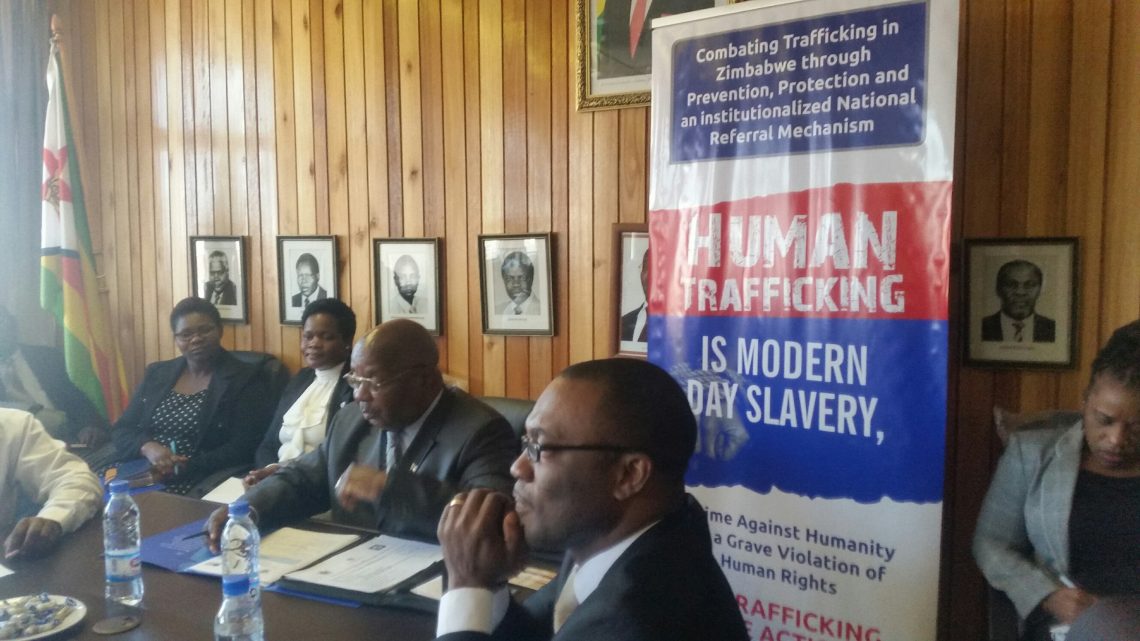By Byron Mutingwende
The United States (US) Department of State is funding a project to complement the government of Zimbabwe in the fight against human trafficking.
Speaking at the launch, Melusi Matshiya, the Permanent Secretary of the Ministry of Home Affairs and Cultural Heritage said in line with international best practices, the government of Zimbabwe has enacted a law that criminalises human trafficking and further sets the frame of reference in the national response strategy.
“In 2014, the government domesticated the Palermo Protocol to prevent and suppress trafficking through the enactment of the Trafficking in Persons Act (TIP Act). The TIP Act gave provision for the establishment of the Anti-Trafficking Inter-Ministerial Committee (ATIMC) as the national coordinating body in the response against human trafficking in Zimbabwe,” Matshiya said.
Members from different government departments and line ministries constitute the ATIMC. The Act further provides for the ATIMC to develop a National Plan of Action (NAPLAC) to guide the human response to human trafficking. The NAPLAC was developed and launched in 2016 covering three years up to 2018.
With the support of cooperating partners like such as the International Organisation for Migration (IOM) and the United Nations Office on Drugs and Crime (UNODC), the government of Zimbabwe is embarking on initiatives to combat human trafficking.
“Today’s event presents yet another opportunity to build on the various partnership initiatives that the governments of Zimbabwe and United States of America have enjoyed over time in response to TIP. I have no doubt that the TIP supported project we are witnessing its launch today, will go a long way complementing the efforts of government of Zimbabwe in its response to human trafficking,” Matshiya said.
Daniel Sam, the Project Manager of IOM Zimbabwe said IOM received funding from the US Department of State’s Office to Monitor and Combat Trafficking in Persons to implement various counter trafficking activities in collaboration with the government of Zimbabwe.
“This 36-month project seeks to enhance the government of Zimbabwe and civil society efforts to coordinate anti-trafficking response through strengthened protection to identified victims of trafficking; improved capacity of targeted communities to prevent trafficking in and; and institutionalised national referral mechanism,” Sam said.
Trafficking in human beings has become a global, organised business that generates huge profits for traffickers and organised crime syndicates. The crime severely violates human rights of victims and destroys their physical, mental and emotional wellbeing.
“Traffickers profit from non-existent or relatively lax sanctions in many parts of the world, insufficient coordination among authorities, and little awareness on the part of potential victims about the dangers of trafficking,” Sam said.
He added that trafficking as a “business” is relatively low risk and highly profitable because women and children are treated as commodities that can be resold numerous times.
The trafficking of women and children has evolved into one of the most tragic features of contemporary global migration because of the nature of trafficking, which makes statistical analysis extremely difficult.
Sam said the US fund would build on the technical and training assistance for shelter management staff held in the first quarter of 2018. The project would also build strategies with other initiatives being implemented in the country as part of the 11th European Development Fund project on Promoting Migration Governance in Zimbabwe, and a project titled, “Addressing Irregular and Mixed Migration Flows in Southern Africa Phase 8” with funding from the US Department of State Bureau of Population, Refugees, and Migration (PRM).
